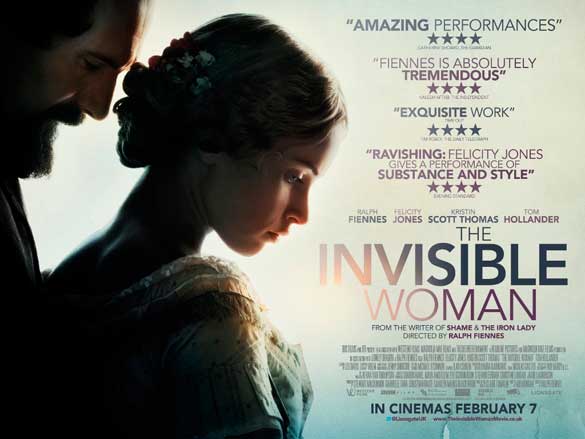LFF 2013: The Invisible Woman ****
Ralph Fiennes makes each new directorial project feel like a burning passion, a chance to reveal new elements to an infamous character. His Charles Dickens in The Invisible Woman sheds new light on a renowned author not so famed for his private life. In the title role, Fiennes strips down the celebrity into a humble, creative man full of flaws and temptation, throwing the full weight of his acting expertise behind the character. He does this with due care not to upstage the main subject, Nelly (played by Felicity Jones), and her harrowing life story. Fiennes’ Dickens merely illustrates the journey of one independent woman’s life but his huge influence on that trajectory.
The story is told from the perspective of Nelly, an educated young woman from a travelling, all-female family of actors who meets and forms a relationship with a married Dickens at the height of his blossoming career in both theatre and writing. She becomes his secret lover until his death.
Fiennes does well to establish his heroine in a scene from the offset, reminiscent of Jane Campion’s Ada from The Piano in her striding figure across a beach. This image alone tells us all we need to know about Nelly and her fiercely protective nature over her background. Jones is fully believable in the role, adding poise, elegance and a flicker of fragility to Nelly. The wooing game is gradually played out as we watch the standard confinements by the etiquette of the time saddled on Nelly’s young shoulders while Dickens reels her in with his carefree spirit and easy affability. It makes for an intense mating dance that feels as dangerous as it is rousing; like a moth to a flame. There does seem some lag before the consequences to the Dickens family are felt though.
Fiennes deliciously portrays Dickens, warts and all, forever toying with our opinion as Dickens moves between perfect host and brilliant writer and callous cad and adulterer. However, these different personas are skilfully blurred as Dickens retains our empathy at his own restrictions in then-society. The result is a love tragedy that feels out of control but ultimately ironic as both are victims and successors at different times. Abi Morgan’s screenplay accentuates this equilibrium, as Rob Hardy’s (A Boy) cinematography creates the right ambiance in the more intimate moments.
The Invisible Woman feels like a more approachable and mainstream offering than Fiennes’s art-house and theatrical Coriolanus. It is a true and solidly acted period love drama that British filmmaking is so skilled in effortlessly delivering. It is compelling as the characters flex their muscles in a constrained environment full of creative passion. It serves its purpose in exposing new intrigue in one of Britain’s great literary authorities too. Fiennes knows his strengths and returns to them full flow.
4/5 stars
By @FilmGazer
